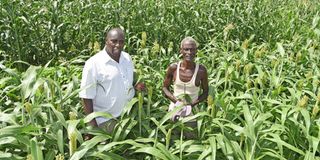Food systems need to be sustainable to combat climate change

Sorghum planted at the Katilu Irrigation Scheme in Turkana South, Turkana County in this past photo.
What you need to know:
- Reducing food waste and adopting more mindful approaches to consumption can significantly curb emissions.
- We must act decisively, and agriculture cannot be exempted from this glaring warning.
Climate change, as one of the triple planetary crises and its negative impact on food systems, is a stark reality at our doorsteps.
While much attention rightly focuses on sectors like energy and transportation, we must not overlook agriculture’s contribution to worsening climate change.
A staggering one-third of global greenhouse gas emissions stem from our food systems. From cultivation to consumption, every step of the food’s value chain contributes to greenhouse gas emissions.
Methane emissions from livestock, nitrous oxide from fertilisers, deforestation for expanding farmland, and the reliance on fossil fuels in modern agricultural machinery have significant consequences on climate change.
The Intergovernmental Panel on Climate Change (IPCC) Sixth Assessment Report paints a dire picture of climate change. Some impacts are irreversible, particularly in sectors like agriculture where modernised farming has compounded more complexities – making it tediously slow to combat climate change. The AR6 Synthesis Climate Change 2023 Report by IPCC shows that in 2019, approximately 22 percent of global emissions came from agriculture, forestry, and other land use.
Projections from the World Meteorological Organization, warn of unprecedented temperatures levels over the next five years. Experts indicate that there is 66 percent probability that by 2027, the average annual global temperature will exceed pre-industrial levels by more than 1.5 °C by at least one year. And there is a 98 percent probability that at least one of the next five years will be the hottest ever recorded.
We must act decisively, and agriculture cannot be exempted from this glaring warning. First, consumer choices matter. Reducing food waste and adopting more mindful approaches to consumption can significantly curb emissions.
Composting, a natural process of recycling organic matter, not only reduces waste but enriches soil health, aiding in carbon sequestration. Sustainable livestock farming helps the land capture and hold onto carbon.
According to FootPrint, rotating pasture-raised animals and crops can also improve soil and help prevent water pollution.
Carbon farming, which focuses on the use of agricultural techniques to capture and store carbon in the soil aids in curbing climate change effects.
Moreover, integrating renewable energy sources such as using wind power and solar energy in farms can further reduce carbon footprints.
This calls for alternative methods of farming, such as regenerative farming and climate-smart agriculture to boost yields and income while reducing emissions for a viable future for the planet.
In addition, we live in a global village, a world interconnected using new media technologies. Therefore, we can benefit from technological innovations such as the advent of mobile applications that can track a set of sustainable habits and offer valuable tools for individuals to monitor and reduce their environmental impact. UNDP’s Climate Dictionary emphasises the need for accurate, easy-to-understand information about climate change, which is essential, now more than ever.
Education also plays a pivotal role in this process. Inculcating climate-conscious curricula into schools is also a sustainable strategy. This nurtures the younger generation equipped with the knowledge and skills to combat climate change effectively.
For communities to be resilient against climate change, they need political commitment and the support of like-minded organisations. For example, at a regional scale, cooperation is essential. Bodies like the New Partnership for Africa's Development and the East African Community need to harmonise strategies and approaches across borders towards achieving sustainable food systems.
The recent Conference of Parties-28 underscored the need for strengthening respective and shared efforts by 2025 through orienting policies and public support related to agriculture and food systems to promote activities which increase incomes, reduce greenhouse gas emissions, and bolster resilience, productivity, livelihoods, nutrition, water efficiency and human, animal and ecosystem health while reducing food loss and waste, and ecosystem loss and degradation.
While food systems are climate-exposed, they need not be the means to derail curbing greenhouse gas effects.
Ms Kinyanjui is a Nairobi-based climate change advocate. [email protected].





